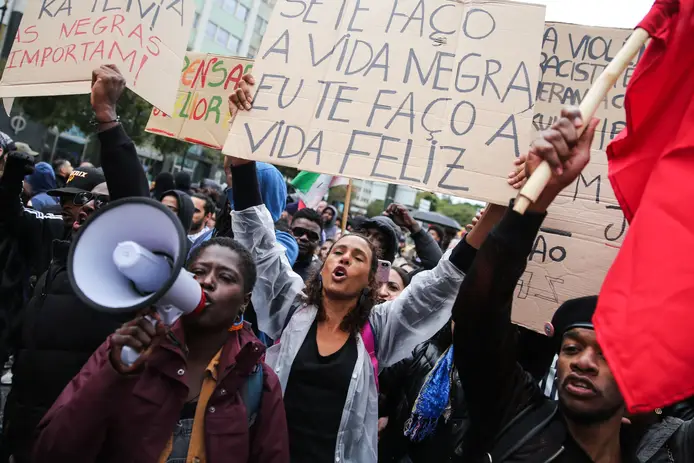Despite increasing reports of racism and xenophobia, Portugal’s main anti-discrimination initiatives are facing institutional paralysis, exposing a glaring disconnect between progressive policy design and its real-world implementation.
A Paralyzed Watchdog
The Commission for Equality and Against Racial Discrimination (CICDR) has been unable to process complaints for over 15 months. Although Isabel Rodrigues, former Secretary of State for Equality and Migration, officially took office as president in December 2024 along with 32 commission members, the commission remains non-operational due to the lack of a regulatory decree that would enable hiring, funding, and infrastructure.
“We are structurally ready, but without this decree, I cannot hire personnel or ensure proper conditions for our work,” Rodrigues told Público Newspaper, warning of legal and procedural risks from handling sensitive cases without technical staff. The body is currently unable to process or investigate complaints, nor publish its annual reports or track nationwide trends.
Low Prosecution Rates, High Archives
Meanwhile, the Judiciary Police (PJ) opened 36 investigations into hate crimes in 2024, a 38% increase from 2023. From 2010 to 2024, there were 183 cases in total. Yet in 2024, only five of 228 inquiries resulted in formal charges—a meagre 2.19%.
Internal accountability within police forces appears equally insufficient. Between 2014 and 2024, the Public Security Police (PSP) opened just 44 disciplinary cases for racism or xenophobia—30 of which were archived, with all other inquiries closed. The national director of the PSP, Luís Carrilho, downplayed these numbers as “infinitesimally small” compared to total citizen interactions.
Citizen complaints to PSP (Public Security Police) over racial or ethnic discrimination totalled 287 during the same period. Of the complainants, 142 were women and 136 men. Brazilians (108) and Portuguese nationals (87) made up the majority. The General Inspectorate of Internal Administration (IGAI) confirms that most of these cases do not result in disciplinary consequences.
A National Plan on Hold
Perhaps the clearest symbol of institutional inertia is the National Plan to Combat Racism and Discrimination 2021–2025 (PNCRD). With only one year remaining, the plan has executed just 16% of its proposed measures, according to the last available data from December 2023. An additional 21% of activities were reported as “in progress,” while 63% were either uninitiated or lacked data altogether. Since then, no new data has been made public by the Prime Minister’s office.
The plan, developed after years of civil society pressure and as a response to the EU’s Action Plan Against Racism (2020–2025), includes over 80 measures and 200 activities across 10 sectors: education, justice, health, employment, housing, culture, digital media, and more. It aimed to mainstream anti-racist strategies within public institutions through four guiding principles: stereotype deconstruction, coordinated governance, integrated inequality interventions, and intersectionality.
Yet several key initiatives have stalled:
- A promised 500 new seats in higher education for students from disadvantaged schools (TEIP) was never implemented.
- A long-anticipated call for research proposals on Portugal’s colonial past and racial memory, led by the Science and Technology Foundation (FCT), remains shelved since 2022.
- A legal aid pilot program for racism victims, developed with the Bar Association and the former High Commission for Migration, is also on hold.
- The national Observatory on Racism and Xenophobia, while created, has faced criticism for excluding racialized people from its leadership.
Former Secretary of State Rosa Monteiro, who spearheaded the plan under the Socialist government, described the situation as a “full stop” in implementation. She notes that the plan initially showed promise, with a 38.5% execution rate across ministries in its first five months. “This was a deliberate, strategic halt. We legislated well, we created ambitious policies—but we didn’t implement them,” she said.
No Political Will, No Institutional Momentum
Members of the working group behind the PNCRD express deep frustration. Sociologist Cristina Roldão notes that the plan didn’t even include bold structural measures like racial quotas. Its poor implementation, she argues, exposes a lack of political will and institutional commitment to inclusivity.
Anabela Rodrigues, a cultural mediator and activist, called the plan a “cosmetic exercise” aimed at avoiding international embarrassment, lamenting that “without political will, it remains ink on paper.”
Bruno Gonçalves, from the Roma rights group Letras Nómadas, goes further: “I blame the previous government more than the current one. They had a two-year absolute majority and still didn’t push it forward. This was a lost opportunity.”
Even implemented measures, such as training programs reaching 5,000 people, remain fragmented and difficult to evaluate due to the absence of public data. An interim evaluation was planned—but never completed—after the Socialist government collapsed.
One of the plan’s central goals was to reform the CICDR itself—an irony not lost on critics, as this very reform caused the watchdog to be inactive for over a year, leaving victims of discrimination in legal and institutional limbo.
A Crisis of Confidence
Across Portugal, signs of a growing accountability crisis are mounting. A 2022 Migration Observatory report found that roughly 80% of all racial discrimination complaints are archived without follow-up. Trust in the system is eroding, especially among racialized communities.
For now, the complaints received by the CICDR are stored by the Agency for Migration and Integration (AIMA), which lacks the mandate to act on them. Meanwhile, the political discourse has grown increasingly wary of addressing racism openly, for fear of fuelling far-right narratives.
“The idea was that speaking about racism would feed the far-right,” said Monteiro. “But avoiding it has only defrauded public expectations—and allowed impunity to thrive.”
Portugal’s anti-discrimination architecture remains fragile. And with only a year left before the PNCRD expires, the window for meaningful change is closing fast.
Sources:
Presidente da CICDR “condena absolutamente” afirmações de membros do Chega | Racismo | PÚBLICO
Queixas de racismo estão num limbo há mais de um ano. Na PJ aumentaram 38% | Racismo | PÚBLICO


Leave a Reply